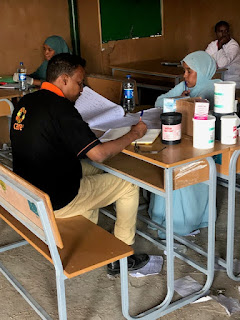Celebrating 10 Years of Serving My Community
 |
| Mawlid attending to a patient. CARE International |
It has been 10 years since I joined CARE International as a nutrition officer. Allah gave me a chance to support my vulnerable community in Somalia delivering humanitarian health and nutrition services.
Over these years, my career developed from being an officer, senior officer, nutrition supervisor, health, and nutrition manager. Now, I am in charge of the CARE Somalia Health Management Information System (HMIS). I have been privileged to work in the Garowe office, Bosaso, Burco, and Ceerigabo, offices. This has exposed me to different communities and the challenges they face in their contexts.
In my current position, I am responsible for ensuring the availability of quality data to make informed decisions. CARE Somalia works across more than 100 health facilities, and I ensure that we provide the most effective services and support to communities.
 |
| Mawlid checking through the files. CARE International. |
Being a humanitarian worker brings with it mixed feelings. Some days you witness the suffering of communities, and it makes you too distraught to even eat. In an effort not to leave anyone behind, you travel to very remote areas where you cannot get good sleep, food, and sometimes even washrooms. However, when you see a member of the community recover from a dire situation they were in, your emotions are totally changed, it brings joy and happiness.
Humanitarian workers in Somalia face numerous security challenges when they are assisting communities. However, most of the Somali community has good people like elders, women, and youth who keep us going and are always willing to support us to provide humanitarian assistance. Over the years, CARE has strived to reach even the most inaccessible and insecure areas.
 |
| Mawlid and his colleague working together. CARE International |
My fondest memory in CARE is when I was tasked with leading a humanitarian response in one of the most insecure areas. I worked with two local organizations to spearhead this response. At first, I was scared as all organizations had refused to send their staff to this area, but I decided to take the risk as I believe that no one should be left behind.
The whole intervention took 25 days to do community mobilization, identification, and registration of the beneficiaries.
We successfully completed the process and delivered aid to the communities who desperately needed it. After going back to my base station, I briefed different clusters on the situation in the “no-go zone”. I also shared how we had worked with the community to get acceptance and it was after sharing my reflections that other organizations started implementing in the area thereby saving many lives.



Comments
Post a Comment